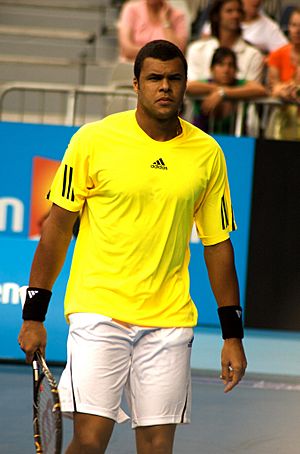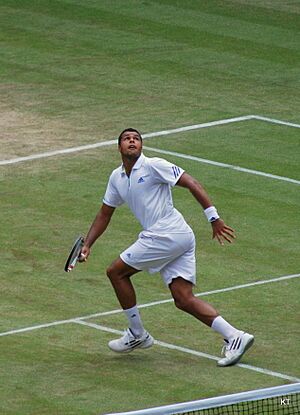Jo-Wilfried Tsonga facts for kids
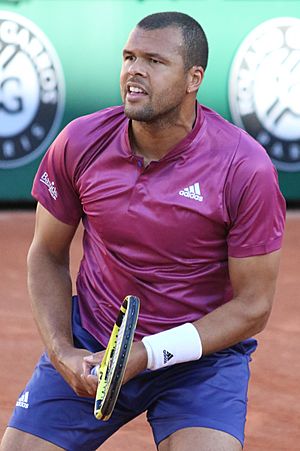
Tsonga at the 2021 French Open
|
||||||||||||||
| Country (sports) | ||||||||||||||
|---|---|---|---|---|---|---|---|---|---|---|---|---|---|---|
| Residence | Gingins, Switzerland | |||||||||||||
| Born | 17 April 1985 Le Mans, France |
|||||||||||||
| Height | 1.88 m (6 ft 2 in) | |||||||||||||
| Turned pro | 2004 | |||||||||||||
| Retired | 2022 | |||||||||||||
| Plays | Right-handed (two-handed backhand) | |||||||||||||
| Coach | Éric Winogradsky (2004–2011) Roger Rasheed (2012–2013) Nicolas Escudé (2013–2015) Thierry Ascione (2013–2022) Sergi Bruguera (2019–2022) |
|||||||||||||
| Prize money | US$22,458,018
|
|||||||||||||
| Singles | ||||||||||||||
| Career record | 467–238 (66.24%) (66.2%) | |||||||||||||
| Career titles | 18 | |||||||||||||
| Highest ranking | No. 5 (27 February 2012) | |||||||||||||
| Grand Slam singles results | ||||||||||||||
| Australian Open | F (2008) | |||||||||||||
| French Open | SF (2013, 2015) | |||||||||||||
| Wimbledon | SF (2011, 2012) | |||||||||||||
| US Open | QF (2011, 2015, 2016) | |||||||||||||
| Other tournaments | ||||||||||||||
| Tour Finals | F (2011) | |||||||||||||
| Olympic Games | QF (2012) | |||||||||||||
| Doubles | ||||||||||||||
| Career record | 83–67 (55.33%) (55.3%) | |||||||||||||
| Career titles | 4 | |||||||||||||
| Highest ranking | No. 33 (26 October 2009) | |||||||||||||
| Grand Slam doubles results | ||||||||||||||
| Australian Open | 2R (2008) | |||||||||||||
| French Open | 2R (2021) | |||||||||||||
| Wimbledon | Q1 (2007) | |||||||||||||
| Team competitions | ||||||||||||||
| Davis Cup | W (2017) | |||||||||||||
| Hopman Cup | W (2014) | |||||||||||||
|
Medal record
|
||||||||||||||
Jo-Wilfried Tsonga is a French former professional tennis player. He was once ranked as high as world No. 5 by the Association of Tennis Professionals (ATP) in February 2012. Tsonga won 18 singles titles on the ATP Tour, including two major Masters 1000 titles.
He became well-known after reaching the 2008 Australian Open final as an unseeded player. He beat several top players, including world No. 2 Rafael Nadal, on his way to the final. Tsonga also won a silver medal in men's doubles at the 2012 Summer Olympics with Michaël Llodra. He helped France win the Davis Cup in 2017. Tsonga retired from tennis at the 2022 French Open.
Contents
- Early Life and Family
- Tennis Career Highlights
- Starting Professional Tennis (2004–2006)
- Breaking into the Top 50 (2007)
- First Major Final and Masters Title (2008)
- First Masters 1000 Doubles Title (2009)
- Davis Cup Final (2010)
- Tour Finals and Paris Masters Finals (2011)
- World No. 5 and Olympic Silver (2012)
- French Open Semifinal and 10th Title (2013)
- Hopman Cup Champion and Second Masters Title (2014)
- Fourth Masters Final (2015)
- Wimbledon and US Open Quarterfinals (2016)
- Four Titles and Davis Cup Win (2017)
- Injuries and Return (2018–2021)
- Retirement (2022)
- Key Rivalries
- Playing Style
- Equipment
- Career Statistics
- See also
Early Life and Family
Jo-Wilfried Tsonga was born on April 17, 1985, in Le Mans, France. His father, Didier Tsonga, was a handball player from the Republic of the Congo. His mother, Évelyne Tsonga, is French. Tsonga is sometimes called "Ali" because he looks a bit like the famous boxer Muhammad Ali.
His cousin, Maël Lépicier, is a professional footballer who plays for the Congo.
Tsonga started playing junior tennis at age 15 in July 2000. He had a very successful junior career. He won the 2003 US Open boys' singles title. He also reached the semifinals of the other three junior Grand Slam events in the same year. His highest junior ranking was world No. 2 in October 2003.
Tsonga married Noura El Shwekh on July 21, 2018. Their first child, a boy, was born on March 17, 2017.
Tennis Career Highlights
Starting Professional Tennis (2004–2006)
Tsonga became a professional tennis player in 2004. He made his first appearance in an ATP Tour tournament at the 2004 China Open. There, he surprised everyone by beating former world No. 1 Carlos Moyá in the first round.
However, Tsonga faced many injuries from late 2004 to 2006. These injuries included problems with his back and shoulder. Because of this, he played in only a few ATP Tour tournaments during these years.
Breaking into the Top 50 (2007)
In January 2007, Tsonga was ranked No. 212 in the world. He received a special entry into the 2007 Australian Open. He played a very long tiebreak against Andy Roddick in the first round, which he won 20–18.
Later in 2007, Tsonga won four smaller Challenger titles. At Wimbledon 2007, he reached the fourth round for the first time in a Grand Slam. He beat Feliciano López before losing to his friend Richard Gasquet. By the end of 2007, Tsonga's ranking jumped over 150 spots to No. 43. He also won his first doubles title with Sébastien Grosjean in Lyon.
First Major Final and Masters Title (2008)
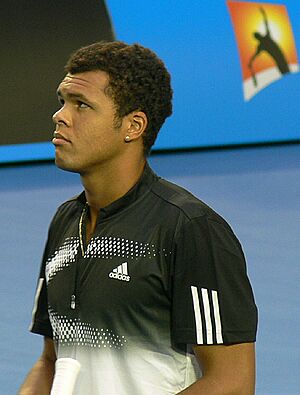
Tsonga started 2008 strongly. He won a doubles title in Sydney with Richard Gasquet, beating the top-ranked Bryan brothers.
At the 2008 Australian Open, Tsonga had an amazing run. He defeated top players like Andy Murray and Richard Gasquet. In the semifinals, he shocked world No. 2 Rafael Nadal in straight sets. This win sent him to his first Grand Slam final, where he played against Novak Djokovic. Tsonga lost the final in four sets, but he was the only player to win a set against Djokovic in that tournament. His ranking then climbed to No. 18.
After recovering from a knee injury, Tsonga won his first ATP singles title at the Thailand Open. He beat Novak Djokovic in the final. He then won his first ATP Masters Series title at the 2008 Paris Masters, defeating David Nalbandian. This win helped him qualify for the year-end Tennis Masters Cup.
First Masters 1000 Doubles Title (2009)
In 2009, Tsonga won the doubles title at the Brisbane International with Marc Gicquel. He also won two singles titles early in the year, in Johannesburg and Marseille.
At the 2009 Australian Open, he reached the quarterfinals. He also made it to the quarterfinals of the Miami Masters. Tsonga achieved his first-ever match win at the 2009 French Open, reaching the fourth round.
In August, Tsonga had a big win at the Rogers Cup in Montreal, beating world No. 1 Roger Federer. He then won his first ATP World Tour 500 title at the Japan Open. Later, he and Julien Benneteau won their first ATP Masters 1000 doubles title at the Shanghai Masters. Tsonga finished 2009 in the top 10 for the second year in a row.
Davis Cup Final (2010)
Tsonga started 2010 by reaching the semifinals of the Australian Open. He had a tough five-set win over Novak Djokovic in the quarterfinals, but then lost to Roger Federer.
He faced more injuries in 2010, including a hip injury that forced him to withdraw from the 2010 French Open. He also missed the US Open due to a knee injury. Tsonga ended the season outside the top 10 and did not reach any singles finals.
Tour Finals and Paris Masters Finals (2011)
In 2011, Tsonga reached his first final in almost two years at the Rotterdam tournament. He then had a memorable run at the 2011 Wimbledon Championships. In the quarterfinals, he came back from two sets down to defeat Roger Federer, which was a huge upset. He then lost to Novak Djokovic in the semifinals.
Tsonga won two singles titles in 2011: the Moselle Open and the Erste Bank Open in Vienna. He also reached the final of the Paris Masters, where he lost to Roger Federer. His strong performance helped him qualify for the Barclays ATP World Tour Finals. He reached the final there, but again lost to Roger Federer. Tsonga finished 2011 ranked No. 6, matching his career high.
World No. 5 and Olympic Silver (2012)
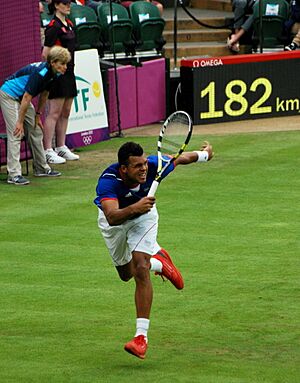
Tsonga began 2012 by winning the 2012 Qatar Open singles title. In February 2012, he reached his career-high ranking of world No. 5.
At the 2012 London Summer Olympics, Tsonga had a very long match against Milos Raonic, which became the longest match in Olympic tennis history by number of games. He reached the quarterfinals in singles. In men's doubles, Tsonga and Michaël Llodra won the silver medal, losing to the American Bryan brothers in the final.
He won his ninth ATP singles title at the 2012 Moselle Open. Tsonga qualified for the ATP World Tour Finals again, but he did not win any matches there.
French Open Semifinal and 10th Title (2013)
At the 2013 Australian Open, Tsonga reached the quarterfinals, losing a close five-set match to Roger Federer. In February, he won his 10th ATP World Tour title at the Open 13 in Marseille, beating Tomáš Berdych in the final.
At the 2013 French Open, Tsonga had a big win over Roger Federer in the quarterfinals. This made him the first French player to reach the semifinals there since 2008. He then lost to David Ferrer in the semifinals. An injury later in the year caused him to miss the US Open.
Hopman Cup Champion and Second Masters Title (2014)
Tsonga started 2014 by winning the Hopman Cup with his teammate Alizé Cornet.
He had an excellent performance at the Rogers Cup in Toronto. He won his second Masters title by defeating Roger Federer in the final. What was even more impressive was that he beat four top-10 players in that tournament, including Novak Djokovic, Andy Murray, and Federer. This was a rare achievement in tennis.
Fourth Masters Final (2015)
After dealing with injuries, Tsonga returned to form in 2015. He reached his second French Open semifinal, beating Tomáš Berdych and Kei Nishikori. He lost to Stan Wawrinka in the semifinals.
At the 2015 US Open, Tsonga reached the quarterfinals without losing a single service game. He then lost a very close five-set match to Marin Čilić. Tsonga won his 12th singles title at the Moselle Open. He also reached the final of the Shanghai Masters, where he lost to Novak Djokovic. Despite the loss, he re-entered the world's top 10.
Wimbledon and US Open Quarterfinals (2016)
In 2016, Tsonga reached the quarterfinals of the Monte Carlo Masters, where he beat Roger Federer. He also made it to the quarterfinals at Wimbledon and the US Open. At Wimbledon, he lost a five-set match to Andy Murray. At the US Open, he had to retire from his quarterfinal match against Novak Djokovic due to injury.
Four Titles and Davis Cup Win (2017)
In 2017, Tsonga had a very successful year, winning four singles titles. He won the Rotterdam title and his third Open 13 title in Marseille. He also won his first clay-court title at the Lyon Open and another title at the European Open in Antwerp.
In November 2017, Tsonga helped France win their 10th Davis Cup title, and their first in 16 years. He won one of his singles matches in the final against Belgium.
Injuries and Return (2018–2021)
Tsonga faced more injury challenges in 2018. He had left knee surgery in April, which caused him to miss several major tournaments, including the French Open, Wimbledon, and US Open. His ranking fell outside the top 50 for the first time in many years. He returned to play late in the year and also played in the Davis Cup final, which France lost to Croatia.
In 2019, Tsonga made a strong comeback. He won two titles: the Open Sud de France and the Moselle Open. He also reached the quarterfinals of the Paris Masters. His ranking improved significantly, jumping from 239 at the start of the year to 29.
Tsonga played only two matches in 2020 before deciding to take a break due to the COVID-19 pandemic. In 2021, he continued to struggle with injuries, playing only a few matches and winning just one.
Retirement (2022)
Tsonga returned to the tour in February 2022. On April 6, 2022, he announced that he would retire from professional tennis at the 2022 French Open. He played his last match on May 24, 2022, losing in the first round to Casper Ruud.
Key Rivalries
Tsonga vs. Djokovic
Tsonga had a notable rivalry with Novak Djokovic. They played 23 times, with Djokovic winning 17 of those matches. Their first big match was the final of the 2008 Australian Open, which Djokovic won.
They met again in the quarterfinals of the 2010 Australian Open, where Tsonga won in five sets. At Wimbledon in 2011, they played in the semifinals, and Djokovic won. They also had a long, tough quarterfinal match at the 2012 French Open, which Djokovic won in five sets after Tsonga had match points.
In 2014, Tsonga finally beat Djokovic again at the 2014 Rogers Cup, ending a streak of nine losses against him.
Tsonga vs. Federer
Tsonga and Roger Federer played 18 times, with Federer winning 12 matches. They had some exciting Grand Slam matches. At Wimbledon in 2011, Tsonga made history by beating Federer after being down two sets to love. They also played in the final of the 2011 Paris Masters and the 2014 Rogers Cup, with Tsonga winning the latter.
Tsonga vs. The Big Four
Tsonga has achieved some special things against the "Big Four" of tennis (Roger Federer, Rafael Nadal, Novak Djokovic, and Andy Murray):
- He is one of only three players (along with Tomáš Berdych and Stan Wawrinka) to have beaten all four members of the Big Four at least once in a major tournament.
- Tsonga is one of only two players (the other being David Nalbandian) to have beaten three members of the Big Four in a single tournament. He did this at the 2014 Rogers Cup, beating Djokovic, Murray, and Federer.
- He is one of seven players to win a tournament where all members of the Big Four played.
- Tsonga is one of only three players (along with Andy Murray and Juan Martín del Potro) to defeat Federer, Nadal, and Djokovic when they were ranked world No. 1.
Playing Style
Tsonga was known for his powerful and attacking style of play. He was also very good at moving around the court, especially for someone his height. He was excellent at serving, often hitting aces or winning points quickly. His serve could reach speeds of up to 237 km/h (147 mph).
Court Surfaces
Tsonga played his best tennis on hard courts. He reached the final of the Australian Open in 2008 and the semifinals in 2010. On grass courts, he reached the semifinals at Wimbledon in 2011 and 2012. He generally found clay courts more challenging, but his skills on clay improved over his career. He reached the quarterfinals of the French Open in 2012 and the semifinals in 2013 and 2015. He won his first clay-court title in Lyon in 2017.
Groundstrokes and Net Play
Tsonga's groundstrokes were very aggressive. His forehand was especially strong and accurate. While his backhand was not always as powerful as his forehand, he could still hit attacking shots with it. He was also very skilled at playing close to the net. He could hit both two-handed and one-handed backhands, using the one-handed shot for effective passing shots.
Equipment
Tsonga used Babolat tennis rackets. He started with the Babolat AeroPro Drive+ and later switched to the Babolat Pure Strike in 2018. He was sponsored by Adidas for his tennis clothing.
Career Statistics
Grand Slam Tournament Performance
| Tournament | 2004 | 2005 | 2006 | 2007 | 2008 | 2009 | 2010 | 2011 | 2012 | 2013 | 2014 | 2015 | 2016 | 2017 | 2018 | 2019 | 2020 | 2021 | 2022 | SR | W–L | Win% |
|---|---|---|---|---|---|---|---|---|---|---|---|---|---|---|---|---|---|---|---|---|---|---|
| Australian Open | A | A | A | 1R | F | QF | SF | 3R | 4R | QF | 4R | A | 4R | QF | 3R | 2R | 1R | A | A | 0 / 13 | 37–13 | 74% |
| French Open | Q2 | 1R | A | A | A | 4R | 4R | 3R | QF | SF | 4R | SF | 3R | 1R | A | 2R | A | 1R | 1R | 0 / 13 | 28–13 | 68% |
| Wimbledon | A | A | A | 4R | A | 3R | QF | SF | SF | 2R | 4R | 3R | QF | 3R | A | 3R | NH | 1R | A | 0 / 12 | 32–12 | 73% |
| US Open | Q2 | A | A | 3R | 3R | 4R | A | QF | 2R | A | 4R | QF | QF | 2R | A | 1R | A | A | A | 0 / 10 | 24–10 | 71% |
| Win–loss | 0–0 | 0–1 | 0–0 | 5–3 | 8–2 | 11–4 | 12–3 | 13–4 | 13–4 | 10–3 | 12–4 | 11–3 | 13–4 | 7–4 | 2–1 | 4–4 | 0–1 | 0–2 | 0–1 | 0 / 48 | 121–48 | 72% |
Grand Slam Finals
Singles: 1 (1 Runner-up)
| Outcome | Year | Championship | Surface | Opponent | Score |
|---|---|---|---|---|---|
| Runner-up | 2008 | Australian Open | Hard | 6–4, 4–6, 3–6, 6–7(2–7) |
Year-End Championship Finals
Singles: 1 (1 Runner-up)
| Outcome | Year | Championship | Surface | Opponent | Score |
|---|---|---|---|---|---|
| Runner-up | 2011 | ATP Tour finals, London | Hard (i) | 3–6, 7–6(8–6), 3–6 |
Masters 1000 Finals
Singles: 4 (2 Titles, 2 Runner-ups)
| Outcome | Year | Championship | Surface | Opponent | Score |
|---|---|---|---|---|---|
| Winner | 2008 | Paris Masters | Hard (i) | 6–3, 4–6, 6–4 | |
| Runner–up | 2011 | Paris Masters | Hard (i) | 1–6, 6–7(3–7) | |
| Winner | 2014 | Canadian Open | Hard | 7–5, 7–6(7–3) | |
| Runner–up | 2015 | Shanghai Masters | Hard | 2–6, 4–6 |
Doubles: 1 (1 Title)
| Outcome | Year | Championship | Surface | Partner | Opponents | Score |
|---|---|---|---|---|---|---|
| Winner | 2009 | Shanghai Masters | Hard | 6–2, 6–4 |
Olympic Finals
Men's Doubles: 1 (1 Silver Medal)
| Outcome | Year | Championship | Surface | Partner | Opponents | Score |
|---|---|---|---|---|---|---|
| Silver | 2012 | 2012 London Olympics | Grass | 4–6, 6–7(2–7) |
See also
 In Spanish: Jo-Wilfried Tsonga para niños
In Spanish: Jo-Wilfried Tsonga para niños
 | Selma Burke |
 | Pauline Powell Burns |
 | Frederick J. Brown |
 | Robert Blackburn |


